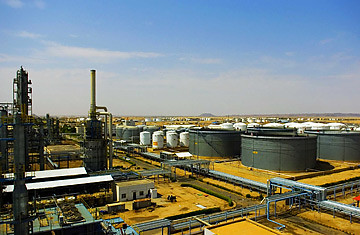
Sudan oil refinery where the newly-emerging oil-rich central African state has been under fire from U.S. imperialism for years. The leadership of the country is being hounded by the ICC which it is not a party to the Rome Statute., a photo by Pan-African News Wire File Photos on Flickr.
Sudan’s projected economic contraction in 2012 worse than expected
April 17, 2012
(WASHINGTON) – The International Monetary Fund (IMF) on Tuesday revised down its forecast to Sudan’s economy to show a significant shrinkage in 2012.
International Monetary Fund Managing Director Christine Lagarde speaks at the Brookings Institution April 12, 2012 in Washington, DC. (AFP)According to the latest release of the World Economic Outlook (WEO), the East African nation achieved a -3.9% growth in 2011. The figure includes South Sudan only up until July 2011 when the country officially broke up into two.
In 2012, Sudan’s economy will contract by -7.3% before improving in 2013 to -1.5% and to 1.7% in 2017.
The loss of the oil-rich south last year meant that Sudan no longer has access to billions of dollars worth of crude reserves. Oil was the main source of foreign currency and revenues for Sudan prior to the country’s partition.
To make matters worse, South Sudan managed last week to take over one of Sudan’s major oilfields of Heglig in South Kordofan through a military occupation that took everyone by surprise. Analysts say that damages to the facilities in the area, which produces half Sudan’s oil, as a result of military operations means that production will not resume anytime soon.
Furthermore, landlocked South Sudan shut down its own roughly 350,000 barrels per day in January in a row over how much it should pay to export crude via Sudan. The latter has built in oil transit fees as part of its budget at the rate of $36 per barrel.
Khartoum has undertaken measures since last year in anticipation of the sharp curtailment in revenues. This includes cutting government spending, partially lifting subsidies and banning a wide range of imports to stop depletion of foreign currency reserves.
But nonetheless, food prices soared to unbearable levels for many citizens prompting limited demonstrations in the Sudanese capital last year. The exchange rate of the Sudanese pound also deteriorated to unprecedented levels amid sharp shortage in hard currency which further fueled price hikes.
The IMF projected consumer prices in Sudan to increase by 23.2% in 2012 and 26.0% in 2013 which is the highest in the Middle East region.
Sudan has turned to a number of friendly nations seeking help to shore up its budget deficits and boost its foreign currency reserves directly or through investments. So far only the Arab Gulf state of Qatar made a $2 billion pledge to assist in the form of buying Sudan government bonds and investments in several economic sectors.
Sudanese officials assert that their country will overcome the loss of oil revenue by exporting more gold and revamping the agricultural sector.
However, this week the Sudanese finance and national economy minister Ali Mahmood Abdel-Rasool said that the 2012 budget as it stands is unsustainable and needs to be amended.
The pro-government al-Rayaam newspaper reported that the Sudanese parliament is poised to approve a second round of lifting subsidies on fuel amid strong objections from the labor union.
(ST)
No comments:
Post a Comment